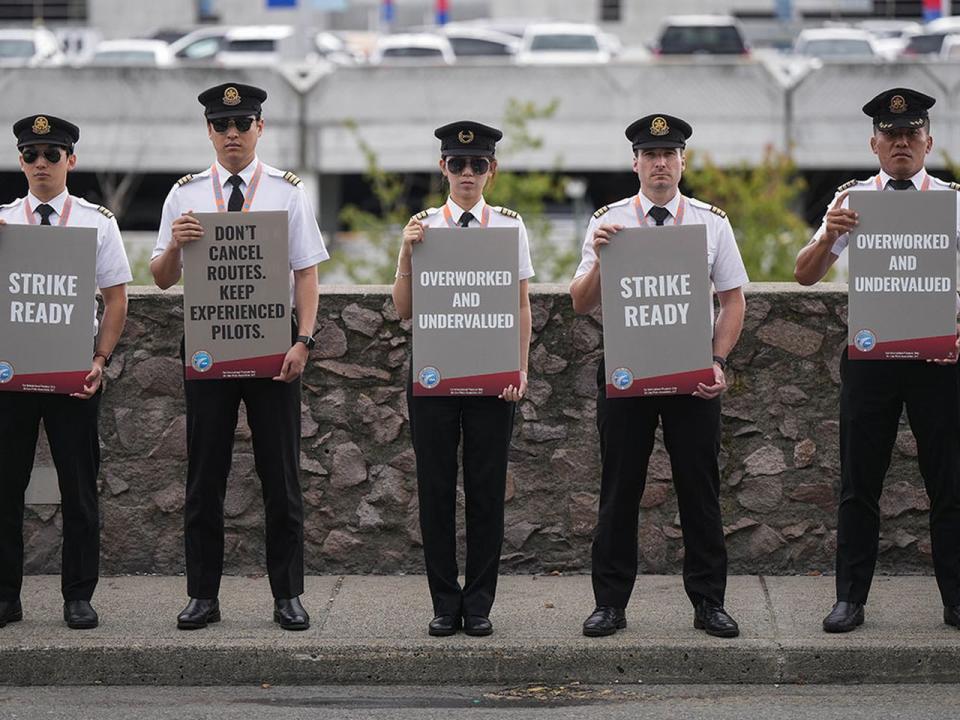Air Canada strike could cost Canada's economy $1.4 billion, economists estimate

The potential labour disruption at Air Canada could cost the economy $1.4 billion, according to a new report from Fédération des caisses Desjardins du Québec.
Economists Randall Bartlett and LJ Valencia estimate that a two-week pilot strike at Canada’s largest carrier could result in daily losses of roughly $98 million, a 0.06 per cent month-over-month loss to real GDP in September.
“Because of its outsized role in the Canadian airline market, a prolonged pilot strike could negatively impact economic activity,” they wrote.
The study measures the direct impact of a potential strike on the air transportation subsector of monthly real GDP, and does not account for costs to other associated industries.
The number of passengers could decrease by 2.1 million, a 29 per cent decline from the previous month, they added.
Air Canada and Air Canada Rouge operate close to 670 daily flights on average, carrying more than 110,000 passengers within Canada or internationally. Air Canada Cargo is the country’s largest air carrier of goods by capacity.
Air Canada pilots could walk off the job as early as Sept. 18. The airline is preparing to wind down operations ahead of Sept. 15, when either the union or the company may issue a 72-hour strike or lockout notice.
Last week, Air Canada said its talks with the Air Line Pilots Association (ALPA) were nearing an impasse over wage demands, and on Wednesday, business groups expressed “deep concern” over the looming strike, which they said would significantly disrupt Canada’s supply chain.
“The potential for a labour disruption is alarming, given the wide-reaching implications it would have on Canadians, the nation’s economy, supply chains and our global reputation,” said the letter by Canadian Chamber of Commerce signed by 41 business groups and 53 local chambers of commerce.
The signatories convened in Ottawa on Thursday to urge the federal government to take action and prevent a work stoppage.
“Canada cannot afford another major disruption to its transportation network,” Business Council of Canada chief executive Goldy Hyder. “A labour disruption at Air Canada would ripple through our economy, from tourism to critical supply chains.”
They said any disruption would result in significant losses for businesses and devastate the travel sector, particularly since September is a peak time for tourism, conferences and events across the country.
The Desjardins economists said their study assumes a strike would last two weeks, similar to the last major Air Canada pilot strike in September 1998. During that time, Air Canada’s losses were estimated at $200 million, or approximately $355 million in today’s prices.
On Thursday, Air Canada issued a statement urging the government to use its powers and order the two parties into binding arbitration in the event an agreement could not be reached in time. Canada’s labour minister Steven MacKinnon was in Toronto that afternoon while the airline and ALPA “remained at the bargaining table, supported by federal mediators,” he posted on X.
“That’s where they need to stay,” MacKinnon wrote. “There’s no reason why these parties can’t work together and get a deal done. Canadians are counting on them.”
On Friday morning, First Officer Charlene Hudy, Air Canada master executive council chair for the ALPA, said in an email, “We continue to meet with Air Canada today in an effort to reach a new contract at the negotiating table and avoid legal job action and the effects of that on our passengers.”
• Email: dpaglinawan@postmedia.com
Bookmark our website and support our journalism: Don’t miss the business news you need to know — add financialpost.com to your bookmarks and sign up for our newsletters here.

 Yahoo Finance
Yahoo Finance 